Guile, violence, and intelligence – The tools of the WW2 spy
- By Travis Pike
Share This Article
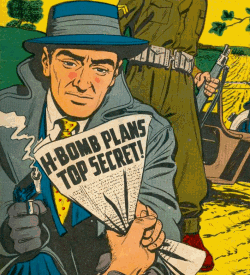
I might be more of an infantry and small arms guy, but I still think spies are damn cool. As a kid, spies fascinated me, and the archetypal WW2 spy, or spies, exemplified the real-life James Bond. These men and women often employed creative means to bring the Nazis to their knees.
I’ve gathered what I think are the five very best spies of World War 2. They range from baseball players to ambulance drivers and all have fascinating stories. These men and women gave their all to defeat the Nazi war machine, and their stories deserve to be told.
Moe Berg
Moe Berg’s background is fascinating. He spoke a dozen languages, graduated from Princeton and Columbia Law, and became a professional baseball player in the MLB. But Moe Berg also became a WW2 spy. Imagine if Derek Jeter turned out to be running ops in Afghanistan during the offseason. It would blow minds. Oh, did I mention he was a champion on a radio quiz show?

He was a fascinating cat. Moe Berg served in both Europe and Japan, working with the OSS from 1943. A man of his intelligence was a natural fit for intelligence operations, plus his background in numerous languages made him an extremely valuable asset. Add in the fact he was charismatic and charming, and you have a veritable Jewish James Bond.

Berg conducted numerous operations as a spy, but his talents were mainly aimed at figuring out what the Germans knew about atomic bombs. He interviewed physicists in Italy, attended conferences, and generally looked for clues regarding Germany producing an A-Bomb. At one point, he was assigned to potentially kill Werner Heisenberg if he thought the Germans could produce the bomb. Moe Berg lived a fascinating life and was the walking epitome of the charming, intelligent, and physically fit spy.
Related: How to Improve Your Pull-ups Like a Navy SEAL
Eddie Chapman
Spies almost always have some odd background, and Eddie Chapman is no different. He spent some time in the Army before going AWOL and being discharged after 84 days in prison. Chapman later became a criminal and a safecracker with London’s West End gangs. He was in and out of prison and was serving time in the Channel Islands when they were invaded by Germany. When the German captured the islands, he volunteered to become a spy for them, and due to his storied history with his home country, the Germans believed he was genuine.

The Germans trained him in Paris, assigned him a mission to destroy British planes, and dropped him over Britain. The Brits knew he was coming due to translated intelligence and planned to capture him. That turned out to be unnecessary as Chapman wasn’t a traitor. He surrendered himself to the police and offered his services to MI5 thus becoming a double agent loyal to Britain.
Chapman met with his German handlers and began slowly gathering information, including two bombs he was supposed to use to blow up a British ship. The Brits faked the ship’s damage and acquired the Germans’ explosives technology. After returning from Britain, he received an Iron Cross from the unaware Germans.
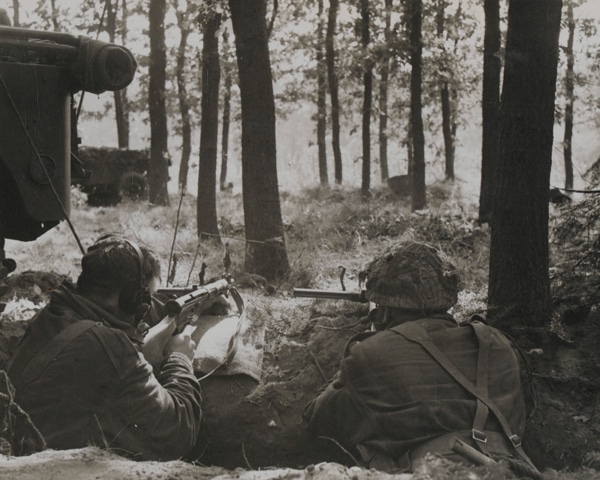
He fed them false information while gathering real information for the Brits, like photographs of actual German agents. Later, he saved countless lives by misreporting the accuracy of V-1 bombs in London, and the Germans continued to inaccurately fire their weapons. After the war, Chapman did mix back in with criminal elements but often got away with his petty crimes due to his wartime contribution.
Jona von Ustinov
Sometimes good men must make hard decisions, even against their fatherland. Jona von Ustinov was a German who fought for his country in the First World War. Yet, he wasn’t a German WW2 spy. He became disgusted with the Nazis and their rising tide of authoritarianism. The breaking point was in 1935 when Ustinov refused to submit proof that he was not of Jewish descent. After that, he left his position in the German embassy and became a British citizen.
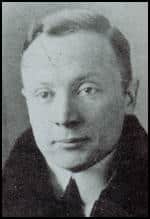
He made friends in high places, including the undersecretary at the Foreign Office, as well as the head of MI5. Ustinov agreed to work with the secret service. His handler described him as the “best and most ingenious operator I had the honor to work with.”
Jona von Ustinov wasn’t a throat-slitting, dagger-in-the-dark spy, but a man of high status who used influence to gather information.
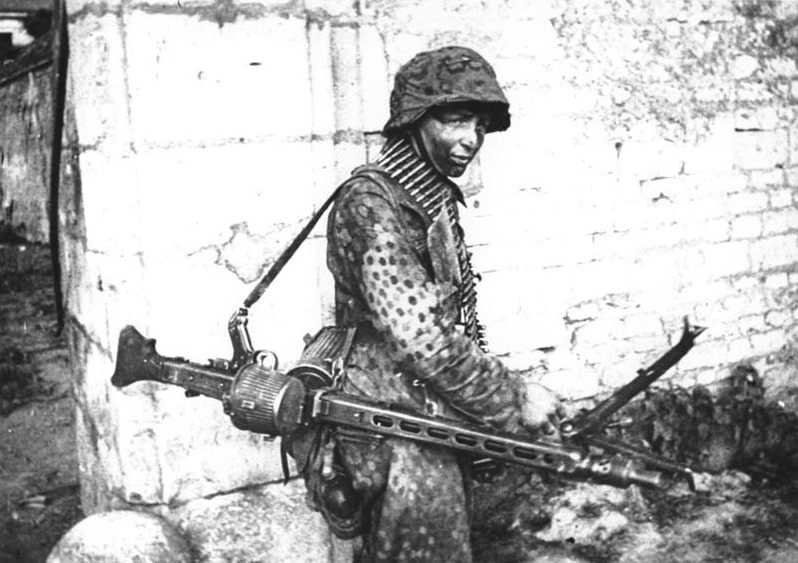
His biggest contribution was the recruitment of Wolfgang zu Putlitz, the first secretary at the German Embassy. Putlitz would sit and essentially confess and relieve himself of the Nazi’s crimes, schemes, and immoral behavior. So, in a way, Ustinov was both a spy and a therapist. His information was passed up consistently, and he even later followed Putlitz to a second posting posing as a reporter. He continued to gather information throughout the war and provided countless sources of vital intel that no one else could gather.
Virginia Hall
Virginia Hall was an American WW2 spy that worked with the Special Operations Executive (SOE) and the Office of Strategic Services in France. The Germans called her the most dangerous of all Allied spies. She lost a portion of her leg in a hunting incident, but even that couldn’t slow her down. She desired to help the WW2 effort and became an ambulance driver in France. When France fell, she sought other employment and found it as a spy.

With a cover as a New York Post reporter, she began to interview, take pictures and gather intelligence. Using make-up, she disguised herself and dressed plainly to avoid drawing attention. She built a network of SOE agents called Heckler. She also organized resistance movements, bribed the right people, supplied agents with money, guns, and other supplies, built safehouses, rescued downed airmen, and more.
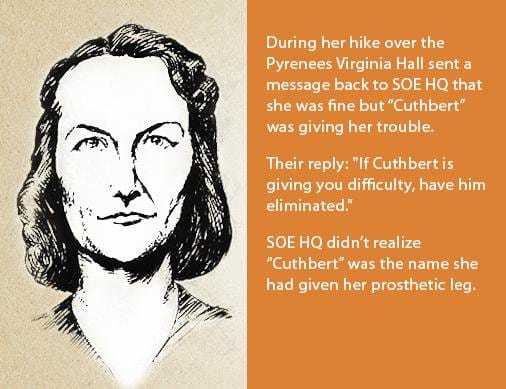
She gathered intel from places others looked over, including brothels and doctors’ offices. She exploited every avenue possible. Hall once arranged the escape of a dozen SOE agents from prison, an act called “one of the war’s most useful operations of its kind.” Virginia Hall would later work for the CIA in the Special Activities Division and even has a training facility at the CIA named after her.
Related: A SEAL Turned CIA Officer’s Advice to Vets Volunteering to Fight for Ukraine
Juan Pujol Garcia
Have you ever met someone so determined to be something they always find a way? Well, Juan Pujol Garcia from Spain wanted to be a WW2 spy. He approached the Brits three times, and they refused his offer. So, he became an independent spy.
He offered his services to the Germans planning to go back to the British as a double agent. Garcia created a cover, tricked a printer into producing a Spanish diplomatic passport, and became a pro-Nazi Spanish government official.
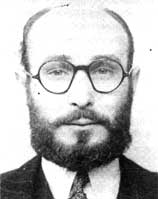
He contacted German intelligence, and they agreed to recruit him and send him to Britain to gather intel. He went to Lisbon instead and began creating reports using tourists guides, reference books, magazines, and newsreel reports that sounded like they genuinely came from London. Garcia convinced the Germans he had an entire network of spies in the UK. His reports were genuine enough that the Brits began a spy hunt after intercepting many of them.
Finally, MI5 realized the intercepted reports were false and the value Juan Pujol Garcia would bring to them. So, he began working as an official double agent. He and his handler wrote so many false reports that the Germans were overwhelmed and did not recruit any other assets in the UK. The reports were a mix of false information, information of little military value, and valuable information that was often delayed and delivered only after the event took place.
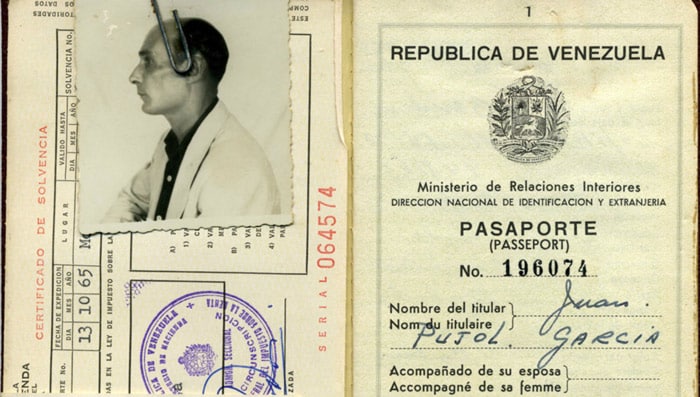
At one point, he convinced the Germans to pay a pension to the widow of one of his many ‘fictional’ agents. Garcia also convinced them to send him the strongest encryption hand they had to encrypt his information. This allowed the codebreakers to gain an edge on Nazi comms.
Operation Fortitude
Fortitude was a massive campaign to disinform Germany about D-Day. Pujol was critical in sending over 500 communications to disinform the Germans whom he convinced that 75 divisions were in Great Britain when in fact, there were only 50. Pujol’s messages were passed directly to Hitler.
His work coordinated with a fake inflatable army the Army set up to deceive the Germans. These actions led the German military to send 19 infantry divisions and two tank divisions to Pas de Calais instead of Normandy, where the real invasion occurred.
The Germans paid Pujol over 300,000 dollars to support his network of 27 fictional operatives. He was awarded the Iron Cross by the Germans and the MBE from the Brits, making him the only person to receive awards from both sides of the war. He later faked his death to avoid Nazi reprisal and lived in relative peace until his actual death in 1988. Without a doubt, he was the most effective WW2 spy.
The WW2 Spies built modern intelligence gathering
World War 2 changed the world, and so did the typical WW2 spy. These men and women provided invaluable information that helped the right side win the war. Their efforts often involved dishonesty, violence, and behavior we typically don’t associate with the good guys. Yet, they saved countless lives and destroyed the world’s greatest evil. Take a drink for the men and women who risked life and limb to defeat the Nazi War Machine through intelligence, subterfuge, and guile.
Read more from Sandboxx News
Related Posts
Sandboxx News Merch
-

‘Kinetic Diplomacy’ Bumper Sticker (White)
$8.00 Add to cart -

‘Sandboxx News’ Camo Trucker Hat
$29.00 Select options This product has multiple variants. The options may be chosen on the product page -

F-35 ‘Evolution’ Framed Poster
$45.00 – $111.00 Select options This product has multiple variants. The options may be chosen on the product page

Travis Pike
Travis Pike is a former Marine Machine gunner who served with 2nd Bn 2nd Marines for 5 years. He deployed in 2009 to Afghanistan and again in 2011 with the 22nd MEU(SOC) during a record-setting 11 months at sea. He’s trained with the Romanian Army, the Spanish Marines, the Emirate Marines, and the Afghan National Army. He serves as an NRA certified pistol instructor and teaches concealed carry classes.
Related to: Military History

The Switchblade, loitering munitions, and the new terrifying face of warfare
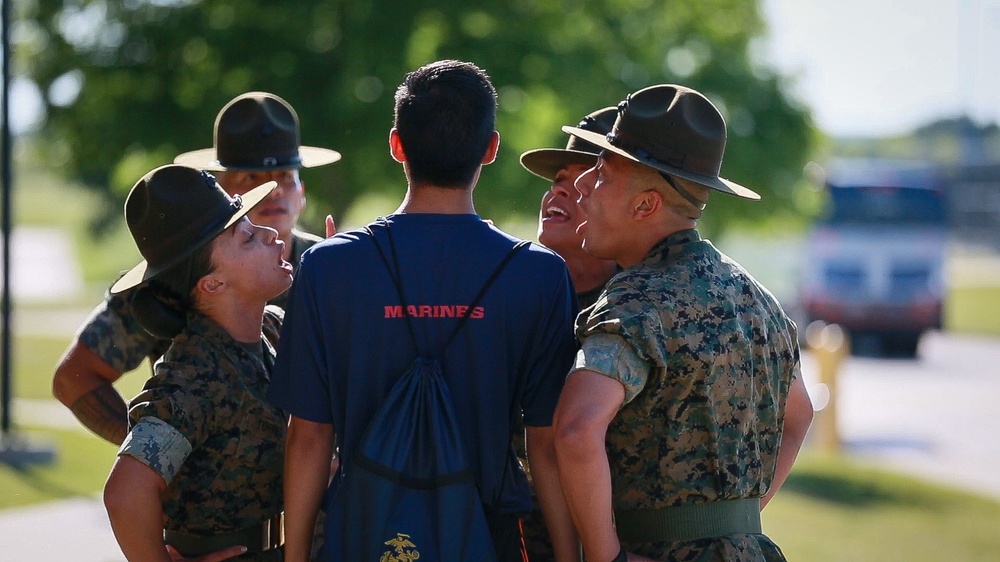
5 ways to prepare and survive the Marine Corps boot camp

Barrett’s Squad Support Rifle System will make infantry squad deadlier

The unique world and uses of howitzers
Sandboxx News
-

‘Sandboxx News’ Trucker Cap
$27.00 Select options This product has multiple variants. The options may be chosen on the product page -

‘AirPower’ Classic Hoodie
$46.00 – $48.00 Select options This product has multiple variants. The options may be chosen on the product page -

‘AirPower’ Golf Rope Hat
$31.00 Select options This product has multiple variants. The options may be chosen on the product page -

‘Sandboxx News’ Dad Hat
$27.00 Select options This product has multiple variants. The options may be chosen on the product page
